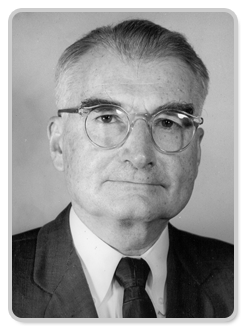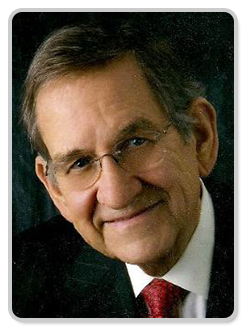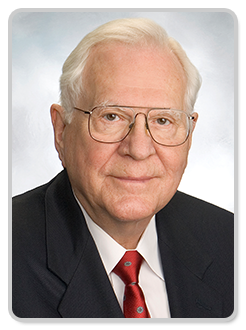Wayne Kearl *
Written by admin on . Posted in Pioneer Broadcaster of the Year, Previous Winners.
1981 Pioneer Broadcaster of the Year
Broadcasters present Kearl TAB’s highest honor
Wayne Kearl of San Antonio received the highest honor the Texas Association of Broadcasters can confer on one of its members Tuesday night when he was named Pior.eer Broadcaster of the Year.
Now in the 40th year of his career in broadcasting, Kearl is Chairman Broadcast/Entertainment, Harte-Hanks Communications, Inc., and president of that group’s broadcast operations.

He was recognized as pioneer broadcaster at a banquet during TAB’s Convention at Loews Anatole Hotel in Dallas.
The award is presented each year to a Texas broadcaster who has been in the industry at least 25 years, and who has added stature to the profession through his work in the industry and in his community.
Kearl has been in television almost as long as TV stations have been broadcasting, beginning in 1949 in the sales departruent of KSL-TV in Salt Lake City.
A native of Alberta, Canada, he attended the University of Alberta and Drigham Young University before taking his first broadcast job in 1941 as an announcer and copywriter for KOVO (AM) in Provo, Utah. He joined the KSL (AM) staff in 1945, and later worked at Los Angeles TV stations before moving to Honolulu in 1952 to help put KGMB, Hawaii’s first television station, on the air.
In 1954, he became sales manager for KENS-AM-TV in San Antonio. He was promoted to general manager of KENS-TV in 1958,
president of the station in 1966, group president of Harte-Hanks TV stations in 1974, and to president for broadcast operations
last year.
In a profile published recently in Broadcasting magazine, Kearl was quoted as noting that he feels satisfaction at having taken part in the development of television.
“As marvelous as that experience has been, he says, he believes that the new technologies that are now coming to influence the medium mean ‘the most exciting period is ahead.’ He believes such advances as cable, home video cassette recording, video disks and teletext services will ‘significantly extend’ today’s basic television service.”
A member of the International Committee of the National Association of Broadcasters, Kearl also has served as chairman
of NAB’s Television Code Review Board.
He and his wife, the former Dorothy Hatch, were married in Provo in 1941. They have three sons: Stan, Ted ard Robert.
Kearl passed away on September 6, 2017 – just seven weeks before his 99th birthday.
E.J. “Jay” Harpole *
Written by admin on . Posted in Pioneer Broadcaster of the Year, Previous Winners.
1980 Pioneer Broadcaster of the Year
Clint Formby *
Written by admin on . Posted in Pioneer Broadcaster of the Year, Previous Winners.
1979 Pioneer Broadcaster of the Year
Clint Formby was born Dec. 6, 1923 in McAdoo, Texas to John and Willie Formby.
He attended schools in Plainview and McAdoo and graduated from McAdoo High School in 1942, where he played basketball, tennis and was quarterback on the six-man football team.
He began college at Texas Tech upon high school graduation, but then enlisted in the US Army.

Formby remained in Switzerland after the end of the war in April 1945 and attended the University of Switzerland in Basel.
He returned stateside and re-enrolled at Texas Technological College, where he was a member of the Socii fraternity.
He was elected president of the Texas Tech student body his senior year and graduated with a Bachelor of Arts degree in journalism in 1949.
While at college, Formby worked during the summer of 1948 to help his uncle Marshall Formby construct KPAN-AM Hereford, working as a carpenter and painter.
His was the first voice on the new radio station when it went on the air August 4, 1948.
Marshall Formby, 12 years older than Clint, was a former county judge and former state senator who went on the serve on the Texas Highway Commission and ran for governor in 1962, with Formby as his campaign manager.
While in college, Formby met Margaret Clark, who was the first Miss Texas Tech.
They courted and were married September 16, 1950 in Van Horn (Margaret’s hometown).
The young couple moved to Colorado City, where they rented a garage apartment from Mr. and Ms. George Mahon, the future US Congressman.
Formby also helped put a radio station in Snyder on the air.
They moved to Hereford August 22, 1951, where he went to work at KPAN and Margaret taught high school English and speech.
Formby was the news reporter, advertising salesman, sometimes sports announcer and tornado chaser, soon becoming manager of the little station.
He eventually replaced Marshall Formby’s original partner and the two men charted a radio path across Texas, eventually being involved in radio stations in Floydada, Tulia, Levelland, Andrews, Seminole, Tyler, Huntsville, Temple and Marshall.
In the 1950s, he would ride the train from Hereford to Chicago to attend the yearly convention of the National Association of Broadcasters (NAB).
Formby also began a daily radio commentary in October 1955 on KPAN called the “Day-by-Day Philosopher,” which broadcast at 7:45 AM, six days a week.
“My little program,” as he called it, continued for nearly 55 years until the day before his death,
The show featured 17,160 consecutive broadcasts.
Formby believed it is the longest-running radio broadcast by an individual in the United States.
KPAN twice received the Texas Association of Broadcasters’ (TAB) Outstanding Radio Station award.
During the period 1962-1972, KPAN received more TAB awards than any Texas radio or TV station.
It is one of two Texas radio stations retained by same family ownership for over 60 years.
Formby became involved in the growing community of Hereford.
He was a member of Jaycees and a past-president of the Kiwanis Club, where he also served as district lieutenant governor and was involved in chartering two new clubs in West Texas.
He served as president of Deaf Smith Chamber of Commerce and received the group’s Citizen of the Year award in 1964.
He received the West Texas Chamber of Commerce Good Neighbor Award.
Formby was a member of First Baptist Church, where he taught the boys’ high school Sunday School class for several years.
He later was a charter member of Fellowship of Believers Church.
He received the Texas Communicator of the Year from the Southern Baptist Convention.
Formby brought cable TV to Hereford. First it was only a few satellite channels, but eventually the full spectrum; and he served managing partner of Hereford Cablevision from 1975-2006.
He served his alma mater – Texas Tech University – in several capacities.
He was a member of the University’s Board of Regents for 12 years and served as chairman.
Formby was involved in the work and lobbying of the legislature to establish a medical school and school of law at Texas Tech.
He served for years as a board member and then president of Texas Tech Ex-Students Association, now Texas Tech Alumni.
He was named a Distinguished Alumnus of Texas Tech University.
He served as a board member and then chairman of the Ranching Heritage Center in Lubbock.
He was a member of and then chairman of the Mass Communications Advisory Committee, and worked long and hard to have Mass Communications established as a separate school at Texas Tech.
He was honored by being inducted into the Mass Communications Hall of Fame, received the Lifetime Support Award in 2001 and has a classroom named in his honor at the school.
Formby was a leader in the broadcast industry at the state and national level.
He was one of dozens of small-market radio owners who made the Texas Association of Broadcasters viable in the 1960s, and went on to serve on the board of directors and as president of TAB.
Formby has been named both Broadcaster of the Year (1994) and Pioneer Broadcaster (1979) by that state organization.
He also served as the small-market radio representative on the board of the National Association of Broadcasters and was chairman of the NAB Radio Board.
He served six years as a member of the corporate board of the Associated Press and was president of Associated Press Broadcasters.
He served 16 years as a board member for Broadcast Music Incorporated (BMI), one of three major music-licensing firms in the United States.
He also served for several years on the executive committee of BMI.
Formby served as president of the Broadcast Education Foundation and as a board member of the Texas Broadcast Education Foundation.
He was an original board member of Texas Telecommunications Infrastructure board.
He and his wife made many close friends on those various boards, and also had the opportunity to travel across the globe.
Trips included an AP trip to Castro’s Cuba and other trips to China, Japan, Canada, Hawaii, Mexico, the Caribbean and virtually every major city in the United States.
He loved to report those travels to his hometown audience on his daily program, which he taped in advance of any trip out-of-town.
Formby was unique in several ways, a few of which can be quantified.
He was the only person to ever appear on the cover of Texas Highways magazine, which set off a minor furor that Formby very much enjoyed.
He was the only single person to have held the offices of Texas Tech student body president, Board of Regents chairman and president of the Ex-Students Association.
He was a dedicated Texas Tech sports fan and held season football tickets since the 1950s, first in section 106 then in section 4 at Jones Stadium.
He loved everything red and black.
Formby had insatiable curiosity and was a voracious reader, subscribing to four daily newspaper and numerous magazines and periodicals.
He watched TV well into the night, and many of his daily radio programs were based on something he had seen or read or heard that deserved further discussion.
Formby was diagnosed with prostate cancer in 1998 but underwent radiation therapy, recovered and gave a running account of the disease and treatment on his radio show.
His frank and open dialog resulted in two Texas Media Awards from the American Cancer Society in 1999.
Ultimately, multiple myeloma was detected in 2005.
Formby loved people and loved to hear their story and had a way of making anyone feel as if he were really, truly interested in their conversation – which he was.
His daily trips to the local banks and post office highlighted his days in Hereford, when he could tell his latest travel story and catch up on the latest local gossip.
He tirelessly promoted Hereford and West Texas to anyone and everyone he encountered in his travels.
Formby’s wife, Margaret, was mother to their children and his main cheerleader.
After the kids were grown, she founded the National Cowgirl Hall of Fame and Western Heritage Center in Hereford and served as its executive director until it moved to Fort Worth.
Formby’s son, Chip, has worked at KPAN since 1978 and became general manager in 1994.
Since 2003, Formby, Chip and Chip’s sons have all worked at the Hereford station – the only Texas radio station with three generations of the same family involved in its operations.
Formby passed away July 31, 2010 at the age of 86.
Read full obituary (www.kpanradio.com)
View Formby’s interview for the “Pioneer of the TAB” project
Wendell Mayes, Jr. *
Written by admin on . Posted in Pioneer Broadcaster of the Year, Previous Winners.
1978 Pioneer Broadcaster of the Year
(Published September 2021)
Former TAB Chairman and Legendary Texas Broadcaster Wendell Mayes, Jr. passed away on September 12. He was 97.
The Mayes family’s broadcast holdings totaled 18 radio stations at one time or another, over a period of five decades.

Stations were located in Amarillo, Austin, Brownwood, Fort Worth, Midland, Snyder, Sweetwater, Victoria, Waco and Oklahoma City.
Mayes served many terms on the TAB Board of Directors, and his fellow broadcasters elected him Chairman in 1964.
TAB presented him with the Pioneer of the Year Award in 1978 and a Lifetime Achiement Award in 2017.
View video (starts at 52.25)
In 1973, Mayes helped create TAB’s scholarship foundation, the Texas Broadcast Education Foundation.
Over the years, he and his fellow broadcasters have raised hundreds of thousands of dollars to help deserving college and university students cover tuition and expenses.
A memorial service will be held at The Episcopal Church of the Good Shepherd, 3201 Windsor Road, Austin, Texas on Friday, September 17, 2021 at 11 AM.
The family requests that masks be worn at the service.
In lieu of flowers, contributions to honor his memory may be made to the American Diabetes Association, Texas Tech University, Schreiner University and St. Edward’s University.
View Texas Tech interview with Mayes for the TAB Broadcast Pioneer project.
Karl O.Wyler *
Written by admin on . Posted in Pioneer Broadcaster of the Year, Previous Winners.
1977 Pioneer Broadcaster of the Year
Ray F. Herndon *
Written by admin on . Posted in Pioneer Broadcaster of the Year, Previous Winners.
1976 Pioneer Broadcaster of the Year
Boyd Kelley *
Written by admin on . Posted in Pioneer Broadcaster of the Year, Previous Winners.
1975 Pioneer Broadcaster of the Year
W.A. “Bill” Roberts *
Written by admin on . Posted in Pioneer Broadcaster of the Year, Previous Winners.
1974 Pioneer Broadcaster of the Year
Vann M. Kennedy *
Written by admin on . Posted in Pioneer Broadcaster of the Year, Previous Winners.
1973 Pioneer Broadcaster of the Year
Broadcasters celebrate Kennedy’s lifetime achievement
More than 300 broadcasters joined the Texas Association of Broadcasters in Corpus Christi to pay tribute to Broadcast Pioneer, Vann Kennedy and raise money for the Texas Broadcast Education Foundation.
Walter Cronkite joined friends and admirers in Corpus Christi to honor the man who has been credited with giving Cronkite his start in broadcast journalism as a wire service reporter in Austin, in 1934.

“He (Kennedy) is the man who made it possible for me to have the career I have had,” Cronkite said.
“He has been my mentor and my idol. He taught me more than any tutor I ever have had. He taught me how to get a story, how to write it. He taught me about ethics. Vann Kennedy is the one we all know who defines honor,” Cronkite said.
The gala was emceed by Cactus Pryor, also a former employee of Kennedy’s, and led with an invocation by Bishop Edmond Carmody of the Diocese of Corpus Christi.
TAB, joined by friends and family of the Kennedy’s, raised more than $40,000 for TAB’s education and scholarship foundation, the Texas Broadcast Education Foundation.
In 1973, Kennedy made the motion to allocate the money for the legal fees and authorize the establishment of the foundation. The Board unanimously passed the motion and Kennedy contributed the first $1,000 to begin the TBEF. Since that day, TBEF has helped more than 100 Texas college and university students in their broadcast journalism studies.
A legendary career
Throughout his life, Kennedy has been a model of hard work and perseverance.
He worked as a paperboy to finance his way through San Marcos Academy. He delivered milk and papers for the San Antonio Express and the Austin American Statesman. At the same time, Kennedy was fascinated by the new medium of radio.
He was only 16 in 1921 when he built his first radio using a crystal detector attached to a coil of wire wrapped around a lacquered oatmeal box with another wire strung in a tree. He could pick up WOAI from San Antonio and fell in love with broadcasting and journalism.
He attended Southwest Texas State Teachers College for two years but quit to join the circulation staff at the San Antonio Express. Kennedy distinguished himself as the only person able to properly install the small crystal radio sets the newspaper decided to give away as a subscription bonus.
His outstanding performance drew the attention of the managing editor of the paper who ultimately granted Kennedy’s plea for a job as a police beat reporter. Crime reporting stirred an interest in law.
Kennedy transferred to the University of Texas for pre-law study but kept up his studies in journalism and reported for the Statesman covering the Capitol beat.
Kennedy soon noticed that Hearst’s International News Service (later United Press International) had no newsroom and, in 1931, paid his own way to New York to persuade the INS to open a bureau in Austin and make Kennedy its manager.
He finagled an office in the Capitol rafters and hired a young man named Walter Cronkite as his assistant.
While working in the Capitol, Kennedy also met another reporter, Mary Louise Witliff, who became his bride. Kennedy has said the smartest thing he ever did was to persuade her to marry him in 1940.
Reporting was Kennedy’s first love but he engaged in many enterprises.
He passed the Texas State Bar Exam in 1934 although he limited his practice primarily to communications matters.
In addition to running the INS bureau, Kennedy founded a monthly magazine, The State Observer, which eventually became the Texas Observer, launched an oil industry newsletter and opened a print shop in South Austin that printed nine publications.
During those years in Austin Kennedy’s reporting earned him the respect of many of the state’s leaders.
He served on the campaign of Gov. James Allred. He wrote speeches for political leaders such as Beauford Jester, John Nance Garner, Sam Rayburn and Lyndon Johnson.
Kennedy served as secretary of the Texas Democratic Party for 10 Democratic conventions and served on the committee that persuaded Lyndon Johnson to accept John Kennedy’s offer of the Vice Presidency.
In 1942 President Roosevelt chose Houston Post newspaper publisher Oveta Culp Hobby to command the Women’s Army Auxiliary Corps. One of her first calls was to Vann Kennedy, still a statehouse reporter in Austin. The concept of women in uniform was difficult for American society of the 1940s to accept. Kennedy was commissioned to handle public relations, the WAAC’s first and only PR officer.
During WWII Kennedy went on to serve in Alaska and China, managing communications lines and broadcasts for the Defense Department. In China he served under General Joseph Stillwell, and was awarded a Battle Star for the Salween Campaign.
He also received the Breast Order of the Yun Hui from the Republic of China. Kennedy left the army as a full colonel.
His wife managed the businesses during the war.
When Kennedy returned in 1946 they took an $11,000 nest egg from the sale of the Observer and their South Austin print shop and scouted Texas for the best city to launch a radio station. Settling on Corpus Christi, Kennedy organized a group of his friends to apply for radio frequency, 1230 kilohertz.
The process involved many FCC hearings and strong competition. Ultimately he won and in 1947 started radio station KSIX at 123 on the dial with the ABC Radio Network. The slogan was “123 with ABC.”
In 1951, the FCC designated two VHF TV channels for Corpus Christi: six and 10. Kennedy organized another board of community leaders to help him apply for channel 10. After a grueling and expensive four-year battle to win FCC approval, channel 10 began broadcasting in September 1956.
The original call letters were changed to KZTV in 1958. In 1970 Kennedy put an FM radio station on the air in Corpus Christi and in 1973 KVTV went on the air in Laredo.
Kennedy has served on both the radio and television affiliate boards of CBS and served two terms on the TAB Board of Directors. TAB named him Pioneer of the Year in 1973.
Today, Vann M. Kennedy still characterizes himself as a southern boy just trying to make a living. Along the way, he has helped hundreds of other do the same, including governors and a U.S. president.
Texas broadcasters are proud to honor him as a Texas Broadcast Legend for his lifelong efforts in broadcasting, journalism and education and for his examples of character, integrity and civility.

All content Copyright © 2026 Texas Association of Broadcasters